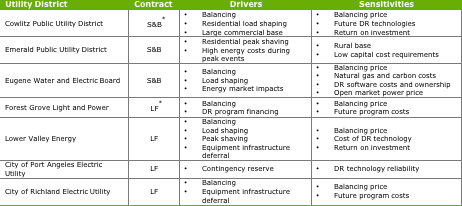Bonneville Power Administration Technology Innovation (Ecofys 2010-2012)
“End-Use Energy Storage and Renewable Integration”

EQL was subcontractor on TI-220. Our role was to manage the demand response (DR) pilot for cold storage, water heaters, ETS Furnaces (Wyoming), and building management systems, and provide economic and utility business case development.
Purpose of the project was to evaluate the ability of energy end uses with thermal storage properties to assist BPA integrate variable energy resources. The project aggregated 1.2 MW of DR assets across residential, commercial, and industrial customers, and provided BPA with 10-minute notice balancing reserves for both increase and decreases in load. Work included technology survey, managing sites, and business case development directed at regional transmission operator and consumer owned utilities. Business case included the cost of program development, marketing, as well as forecasting value of balancing reserves, and peak capacity reductions in the Pacific Northwest. Team consisted of 10 vendors, 9 utilities, several advisors, 2 analysts, and 1 project administrator.
- Outreach and coordination with multiple PNW utilities
- Clark PUD (Wireless thermostats)
- Lower Valley Energy (Steffes thermal brick furnaces and heat pumps)
- Eugene Water & Electric Board (Cold storage, Steffes and Carina hot water heaters)
- Cowlitz Co. PUD (Steffes hot water heaters)
- Forest Grove Light & Power (Cold Storage)
- City of Richland (Cold Storage)
- Consumers Power (Cold Storage)
- City of Port Angeles (General program information sharing)
- Emerald PUD (Business case tool only)
- DR Potential Studies (bottom up engineering)
- Integration of DR equipment with AMI and headend systems (DERMS)
- Development of business case model designed to be used by a broad range of northwest utilities to evaluate smart grid deployment applications. (Spreadsheet application that has been used by utilities to consider capacity focused DSM programs)



